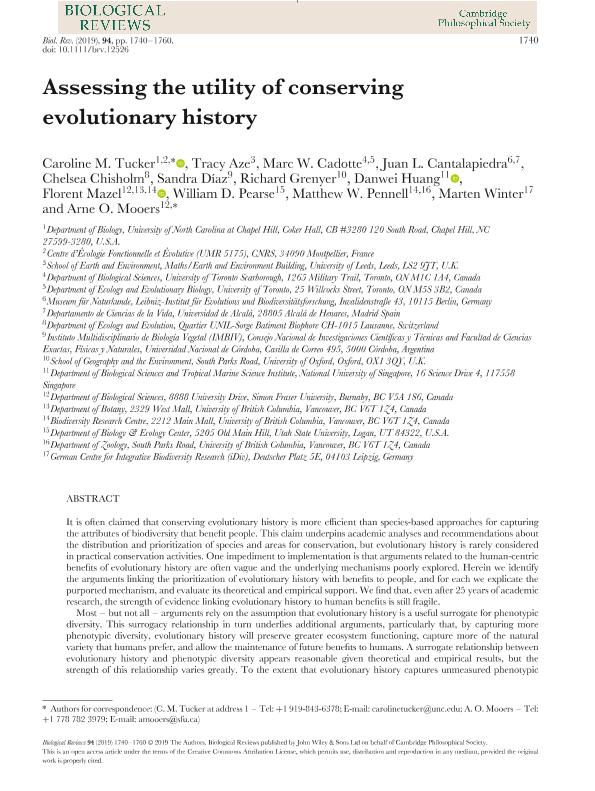Mostrar el registro sencillo del ítem
dc.contributor.author
Tucker, Caroline M.
dc.contributor.author
Aze, Tracy
dc.contributor.author
Cadotte, Marc W.
dc.contributor.author
Cantalapiedra, Juan L.
dc.contributor.author
Chisholm, Chelsea
dc.contributor.author
Díaz, Sandra Myrna

dc.contributor.author
Grenyer, Richard
dc.contributor.author
Huang, Danwei
dc.contributor.author
Mazel, Florent
dc.contributor.author
Pearse, William D.
dc.contributor.author
Pennell, Matthew W.
dc.contributor.author
Winter, Marten
dc.contributor.author
Mooers, Arne O.
dc.date.available
2020-10-05T19:53:51Z
dc.date.issued
2019-10
dc.identifier.citation
Tucker, Caroline M.; Aze, Tracy; Cadotte, Marc W.; Cantalapiedra, Juan L.; Chisholm, Chelsea; et al.; Assessing the utility of conserving evolutionary history; Wiley Blackwell Publishing, Inc; Biological Reviews; 94; 5; 10-2019; 1740-1760
dc.identifier.issn
1464-7931
dc.identifier.uri
http://hdl.handle.net/11336/115454
dc.description.abstract
It is often claimed that conserving evolutionary history is more efficient than species-based approaches for capturing the attributes of biodiversity that benefit people. This claim underpins academic analyses and recommendations about the distribution and prioritization of species and areas for conservation, but evolutionary history is rarely considered in practical conservation activities. One impediment to implementation is that arguments related to the human-centric benefits of evolutionary history are often vague and the underlying mechanisms poorly explored. Herein we identify the arguments linking the prioritization of evolutionary history with benefits to people, and for each we explicate the purported mechanism, and evaluate its theoretical and empirical support. We find that, even after 25 years of academic research, the strength of evidence linking evolutionary history to human benefits is still fragile. Most – but not all – arguments rely on the assumption that evolutionary history is a useful surrogate for phenotypic diversity. This surrogacy relationship in turn underlies additional arguments, particularly that, by capturing more phenotypic diversity, evolutionary history will preserve greater ecosystem functioning, capture more of the natural variety that humans prefer, and allow the maintenance of future benefits to humans. A surrogate relationship between evolutionary history and phenotypic diversity appears reasonable given theoretical and empirical results, but the strength of this relationship varies greatly. To the extent that evolutionary history captures unmeasured phenotypic diversity, maximizing the representation of evolutionary history should capture variation in species characteristics that are otherwise unknown, supporting some of the existing arguments. However, there is great variation in the strength and availability of evidence for benefits associated with protecting phenotypic diversity. There are many studies finding positive biodiversity–ecosystem functioning relationships, but little work exists on the maintenance of future benefits or the degree to which humans prefer sets of species with high phenotypic diversity or evolutionary history. Although several arguments link the protection of evolutionary history directly with the reduction of extinction rates, and with the production of relatively greater future biodiversity via increased adaptation or diversification, there are few direct tests. Several of these putative benefits have mismatches between the relevant spatial scales for conservation actions and the spatial scales at which benefits to humans are realized. It will be important for future work to fill in some of these gaps through direct tests of the arguments we define here.
dc.format
application/pdf
dc.language.iso
eng
dc.publisher
Wiley Blackwell Publishing, Inc

dc.rights
info:eu-repo/semantics/openAccess
dc.rights.uri
https://creativecommons.org/licenses/by-nc-sa/2.5/ar/
dc.subject
BENEFITS TO PEOPLE
dc.subject
CONSERVATION
dc.subject
ECOSYSTEM FUNCTION
dc.subject
EXTINCTION
dc.subject
FUNCTIONAL DIVERSITY
dc.subject
PHENOTYPIC DIVERSITY
dc.subject
PHYLOGENETIC DIVERSITY
dc.subject
PRIORITIZATION
dc.subject.classification
Conservación de la Biodiversidad

dc.subject.classification
Ciencias Biológicas

dc.subject.classification
CIENCIAS NATURALES Y EXACTAS

dc.title
Assessing the utility of conserving evolutionary history
dc.type
info:eu-repo/semantics/article
dc.type
info:ar-repo/semantics/artículo
dc.type
info:eu-repo/semantics/publishedVersion
dc.date.updated
2020-09-21T14:47:38Z
dc.identifier.eissn
1469-185X
dc.journal.volume
94
dc.journal.number
5
dc.journal.pagination
1740-1760
dc.journal.pais
Reino Unido

dc.journal.ciudad
Londres
dc.description.fil
Fil: Tucker, Caroline M.. University of North Carolina; Estados Unidos
dc.description.fil
Fil: Aze, Tracy. University Of Leeds.; Reino Unido
dc.description.fil
Fil: Cadotte, Marc W.. University of Toronto; Canadá
dc.description.fil
Fil: Cantalapiedra, Juan L.. Universidad de Alcalá; España
dc.description.fil
Fil: Chisholm, Chelsea. Universite de Lausanne; Suiza
dc.description.fil
Fil: Díaz, Sandra Myrna. Consejo Nacional de Investigaciones Científicas y Técnicas. Centro Científico Tecnológico Conicet - Córdoba. Instituto Multidisciplinario de Biología Vegetal. Universidad Nacional de Córdoba. Facultad de Ciencias Exactas Físicas y Naturales. Instituto Multidisciplinario de Biología Vegetal; Argentina
dc.description.fil
Fil: Grenyer, Richard. University of Oxford; Reino Unido
dc.description.fil
Fil: Huang, Danwei. National Singapore University; Singapur
dc.description.fil
Fil: Mazel, Florent. University of British Columbia; Canadá
dc.description.fil
Fil: Pearse, William D.. University of Utah; Estados Unidos
dc.description.fil
Fil: Pennell, Matthew W.. University of British Columbia; Canadá
dc.description.fil
Fil: Winter, Marten. German Centre for Integrative Biodiversity Research; Alemania
dc.description.fil
Fil: Mooers, Arne O.. University Fraser Simon; Canadá
dc.journal.title
Biological Reviews

dc.relation.alternativeid
info:eu-repo/semantics/altIdentifier/url/https://onlinelibrary.wiley.com/doi/abs/10.1111/brv.12526
dc.relation.alternativeid
info:eu-repo/semantics/altIdentifier/doi/http://dx.doi.org/10.1111/brv.12526
Archivos asociados
